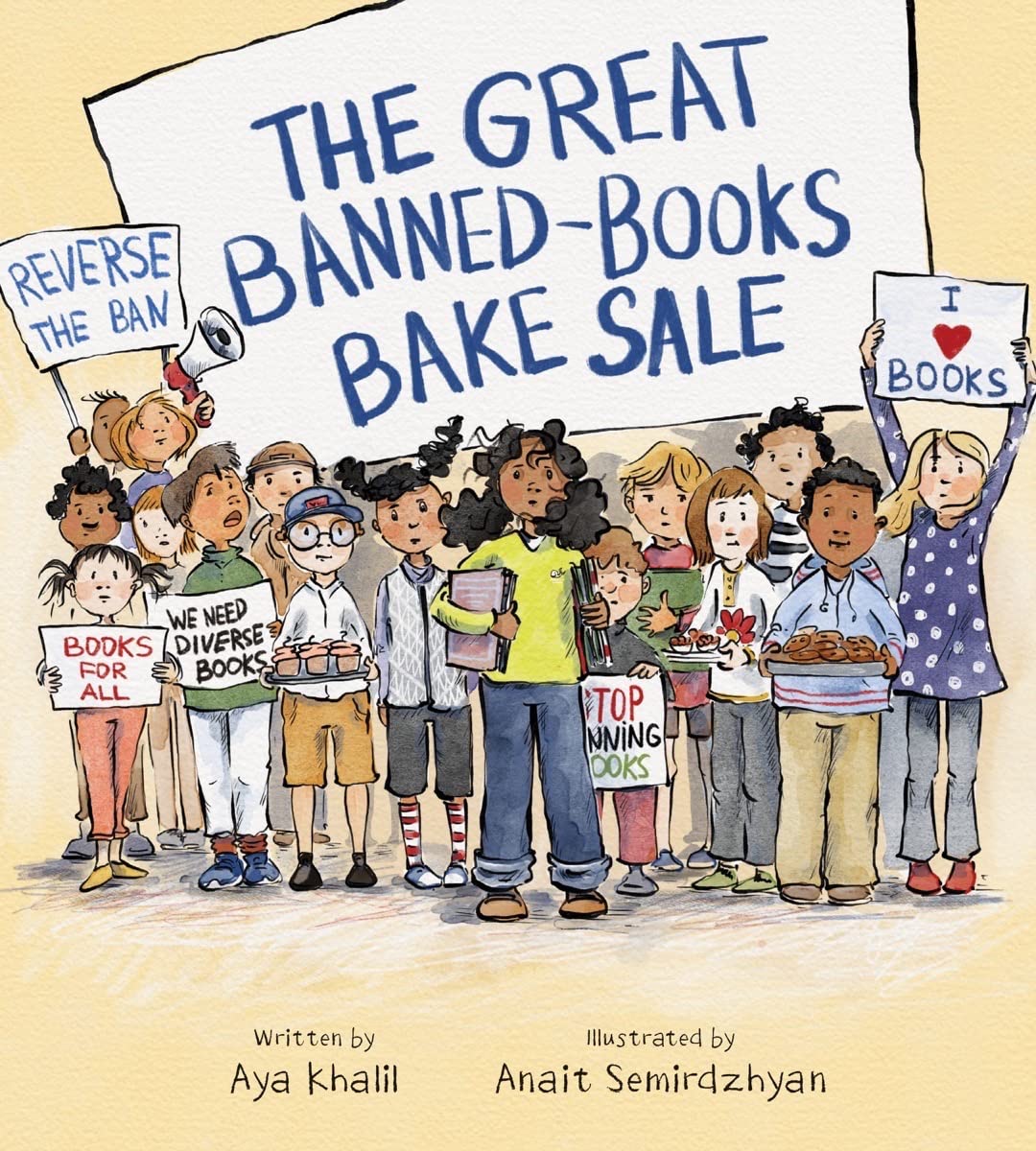CELEBRATING BANNED BOOKS WEEK
Since it is BANNED BOOKS WEEK, as a guest reader, I selected The Great Banned-Books Bake Sale by Aya Khalil illustrated by Anait Semirdzhyan to read to a fourth-grade group. When I asked what a banned book was, one savvy 9-year-old spoke up. “It means the book is not allowed.” Although a general response, she had the gist.
Another student wanted to know, “Is this a true story?” I told him I’d get back to him on that when we finished reading.
In short, the book tells the story of Kanzi, the immigrant girl featured in the author’s book The Arabic Quilt. A lover of books, Kanzi proudly leads the line as her class heads to the library. But, alas, when she enters the library, the bookcase that housed all the new diverse books had been emptied. Kanzi is ready for a fight, ready to restore the books about people who look like her. And Kareem and her fellow students work in solidarity for their cause.
The 4th graders echoed the same question Kanzi asked: “Why would anyone ban books?” And we had quite an exchange about the librarian’s response to that question: “Some books are so powerful that they intimidate people.”
“How could books scare people?” they wanted to know. I’m not sure they really wrapped their heads around it, but, to be sure, they were incensed. And they wanted to take action. Just as Kanzi in the book spearheads a bake sale and protest to buy banned books to put in Little Free Libraries, these 4th graders wanted to do the same. It didn’t hurt that their teacher has her own Little Free Library in front of her house.
Aya Khalil writes in an author’s note that in 2021 a school district in Pennsylvania banned a number of books with diverse characters including Khalil’s The Arabic Quilt, I was thus able to return to the young man’s question: Is this a true story? Even though The Arabic Quilt won awards and even though the author received many messages from parents and teachers about how validated their kids felt after reading The Arabic Quilt, the book was removed from the shelf. Khalil was devastated. That experience inspired her to write The Great Banned-Books Bake Sale.

I followed up this book with The Talk by Alicia D. Williams, illustrated by Briana Mukodiri Uchendu, perhaps my favorite book of 2022. I told them that I doubted they knew what “The Talk” meant (they didn’t), but their teacher knew immediately.
The book introduces readers to Jay whose main thing is hanging out with his friends. They love to race (encouraged by grandpa that they might be the next John Carlos, Wilma Rudolph, or Jesse Owens (cleverly silhouetted in the illustrations). As Jay is missing his two front teeth, he’s got to be a second grader – eager to grow up and looking forward to big-kid stuff. But as they grow, grandpa gives them a warning: not to hang in groups of four or more. While grandpa thinks the kids might be the next Thurgood Marshall, some folks think they’ll be the next troublemaker.
It was at this point in the story that these all-white, probably wealthy kids got it: that black kids are targeted, that people expect them to do bad things. They commented on the illustrations which so skillfully convey the askance looks, the suspicion on the faces of cops, of salespeople, when the Black kids are just living their lives.
When Jay suits up in his favorite hoodie, his dad’s college on the front, ready to meet to his friends, Dad stops him. “Son, Hold on! Wait a second.” It’ was time for The Talk. The wordless two-page spread that follows IS the talk, and it needs no words as it pictorially conveys the dangers of living while black and what consequences the kids are likely to face.
I only wish I could have photographed my listeners’ faces. They got it at an even deeper level. And they were sober in their response.
The end of the book is appropriately upbeat – that Jay is loved, and that he his friends want to “just be...us.”
I think my savvy listeners knew that this is just the kind of book that someone will want censored.
